KEY POINTS
- Nigeria’s non-implementation of ICTN has led to a $2.5 billion revenue loss over five years.
- A flawed contract process has delayed ICTN deployment, causing setbacks in revenue and security.
- The government remains focused on ICTN’s full implementation to enhance port security and streamline cargo tracking.
The International Cargo Tracking Note (ICTN), a system intended to increase income and security by tracking imported goods, has reportedly cost Nigeria’s marine industry $2.5 billion over the course of five years since it has not been implemented.
According to the Nigerian Shippers Council (NSC), the loss is roughly $500 million a year.
During a recent session called by the House of Representatives to look into problems impeding the ICTN’s complete deployment, Pius Akutah, the council’s executive secretary, confirmed this number.
Losses and implementation delays
According to reports, procedural flaws in contract approvals have caused major delays in ICTN implementation, even though the Federal Executive Council (FEC) approved it during the previous administration.
Through Director of Maritime Services Babatunde Sule, Minister of Marine and Blue Economy Gboyega Oyetola admitted that the deployment of the ICTN had been hampered by an incorrect award procedure used by the previous administration.
Sule claims that the problem started with a contested contract that involved five companies, one of which did not sign it, causing operational halts.
Akutah clarified that following two years of partial implementation, the Economic and Financial Crimes Commission’s (EFCC) investigations caused activities to be suspended.
Since then, the ICTN has not advanced due to conflicting interests and bureaucratic obstacles, which has led to significant financial losses and security lapses at Nigerian ports.
Sector reactions and concerns
The adoption of the ICTN is not universally embraced by the maritime industry. Concerns about introducing yet another level of red tape were raised by Boma Alabi, Chairman of the Shipping Lines Association of Nigeria.
Alabi maintained that the current configuration of the ICTN will increase administrative responsibilities without improving security or business-friendliness.
According to Punch, she pointed out that the Central Bank of Nigeria’s single-window system is already connected to the integrated platform of Customs and the digital technologies that shipping lines now offer for tracking cargo.
All commercial, diplomatic, and private exports to Nigeria are required to have a loading certificate under the proposed ICTN. Instead of simplifying procedures, several industry participants contend that this procedure is unnecessary and runs the risk of making the country’s ports even more congested.
Government push for maritime reform
The Nigerian government is still dedicated to the ICTN in spite of opposition from the industry. Abdussamad Dasuki, the chairman of the House Committee on Shipping Services, highlighted how the ICTN may improve Nigeria’s marine operations’ efficiency, security, and transparency.
Dasuki emphasized that the ICTN is crucial for administration as well as for stopping illegal commerce and sealing income leaks.
Dasuki said, “Today’s session is an opportunity to address challenges, conflicting interests, and bureaucratic delays to move the ICTN forward.”
He continued by saying that if the ICTN was properly implemented, Nigeria’s marine sector would be in line with international best practices, smuggling would be prevented, and the nation’s economy would eventually grow.
Together with stakeholders, the Minister’s office is still looking for ways to settle contract-related disputes and clear the path for ICTN implementation.
Nigeria could lose out on income and security advantages in its vital marine sector, though, until these obstacles are removed.


